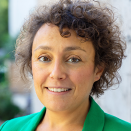EUMEF study tour, February 22-24, 2017, Berlin
What role do think tanks fill today, and what is their impact? How do policy makers perceive the work of these research institutes? How can think tanks successfully transmit their messages at a time when social media dominates the consumption of information? These were some of the questions that the three-day program in Berlin addressed
Participants focused their discussion on the current crisis of the liberal model in general and its impact on think tank work in particular. Think tanks, the media, and other actors mandated with offering sound, fact-based analysis are almost existentially chall by the rise to power of illiberal figures who mobilize masses by means of counter-factual, emotional, and fear-driven messages. Participants held differing positions on how to address this state of affairs. Some pleaded for the need to speed up and simplify the message using social media channels. Others expressed concern that this could sacrifice quality and analytical depth, leading to a decrease in integrity and standard. All participants agreed that think tanks have a core task of being innovative in their work, in addition regaining the public’s trust.
Think tanks working on foreign policy have faced certain challenges for some time. Participants described an ecosystem in which policies are “manufactured" and ministries have their own narrow agendas. In the absence of careful communication and coordination between different ministries, a coherent foreign policy fails to emerge vis-à-vis third parties. At the same time, speakers highlighted that domestic issues play into governments’ foreign policy choices. In Germany, for example, it was noted that parties see curbing migration as a decisive means of winning (or re-gaining) votes in the September 2017 parliamentary elections. Sound policy choices are hence subordinated to power politics.
Policy makers are moreover sometimes too absorbed in day-to-day developments to consult the in-depth analysis and research that think tanks provide. Still, as one policy maker put it, think tanks can be valuable when they find the proper timing; they need to identify a window of opportunity to access policy makers with short and concise recommendations and analysis. The best way to achieve this, according to the speaker, is through personal contacts. Another factor adding to the strained resources of foreign policy makers and complicating the work of think tanks is that “crisis has become the norm.” This is particularly true for the MENA region, where reactive measures and policies often take precedence over pro-active ones based on long-term strategies.
The last session offered practical steps. Participants discussed strategies and tools for advancing their message and reaching policy makers and the larger public. Particularly at a time where power politics are back and norms such as human rights are receiving less attention than before, there is a need to reframe messages – for example translating normative messages into more economic ones – in order to capture the attention of policy makers. The need was also noted to forge more alliances with other actors from civil society that share similar visions, while emphasizing that change also entails self-transformation. Incremental steps rather than absolute goals should therefore be the measure of success.

